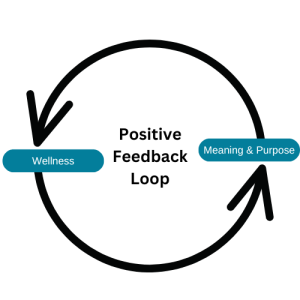2.2 Are Meaning And Purpose Truly Necessary?
Practicing wellness with no meaning and purpose in one’s life is like trying to build a house without a foundation – it cannot stand. Think about it; why bother pursuing wellness (and ultimately optimal being) if life has zero meaning? Without meaning, humans essentially become robots, mindlessly performing tasks without intention, fulfillment, or desire for growth. But we are not robots. We are human beings guided by free will, driven by values, and fueled by desires. Our sense of meaning gives life value, energizes us, and makes the pursuit of wellness worthwhile.
Some individuals may feel their lives have no meaning and purpose, yet they still choose to pursue wellness. This choice suggests that they either hold on to some remaining sense of meaning or have faith that it exists and need, or want, guidance to help reveal it. This type of existential frustration is quite common, especially among young adults, and is a natural part of the human experience. As Viktor Frankl wrote in Man’s Search for Meaning:
“A man’s concern, even his despair, over the worthwhileness of life is an existential distress, but by no means a mental disease” (Frankl, 2006. p. 102).

Research also supports the connection between meaning and wellness. Positive psychology, pioneered by Martin Seligman, highlights meaning as a core component of lasting happiness, life satisfaction, and well-being (Seligman, 2002). Individuals with a strong sense of purpose consistently also experience better health outcomes, such as lower risks of heart disease, stronger immune function, and longer lifespans (Hill & Turiano, 2014).
Wellness often initiates a cascade or compounding effect when pursued in good faith (i.e., deliberately and freely). Initial efforts to achieve optimal being lead to the discovery of meaning and purpose, which further optimizes being and potentially manifests even more profound meaning and purpose.
So, are meaning and purpose necessary for pursuing wellness? This book argues that they are.
Meaning: Understanding Life’s Significance
Meaning involves understanding the value we assign to our experiences and recognizing why certain aspects of life matter to us. It is a reflection of what is most real, both in how we instinctively feel and in how things actually are.
Often reflected in both the past and present, meaning can help us understand and interpret what has happened or is happening and provide a foundation for moving forward. For instance, someone grieving the loss of a loved one might find meaning in their grief by creating a support group, transforming personal pain into a source of comfort and community for others facing similar losses.
Meaning also strengthens our connection to a greater purpose or community. It can be broad, encompassing global causes like environmental conservation, social justice, or advancing scientific knowledge, efforts that impact society as a whole. Alternatively, meaning can be deeply personal, such as nurturing a close relationship, pursuing a lifelong hobby, or honouring a loved one’s memory through daily rituals.
Origin of Meaning

Philosophers, psychologists, and modern thinkers have long debated the origin of meaning. Drawing on his experiences as an Auschwitz survivor and as the founder of Logotherapy, Frankl emphasized that meaning is discovered, emerging from lived experience (Frankl, 1992). It finds you rather than you finding it. This belief is often present in collectivist cultures, which prioritize the needs and goals of the group over individual desires, fostering a sense of belonging and shared responsibility. Rituals and traditions, such as rites of passage and communal ceremonies, provide frameworks for individuals to cultivate meaning and thus discover and reinforce a sense of purpose.
In contrast, the German philosopher Friedrich Nietzsche proposed that individuals can create meaning by defining and living according to their values (Nietzsche, 1961). Individualist cultures prioritize personal goals, independence, and self-reliance and tend to follow this path via personal achievement, reflection, and self-expression. This perspective aligns somewhat more closely with the concept of personal wellness, as it encourages individuals to actively pursue meaning rather than let it unfold on its own.
It is possible that meaning may involve a dynamic interplay between what life presents to us (i.e., discover) and how we choose to engage with it (i.e., create). One could argue it is also highly dependent on each individual’s experiences, values, and worldview.
Whether meaning is found, created, or both, it remains a foundational pillar to the pursuit of wellness.
Purpose: The Driving Force Behind Our Actions
If meaning represents the “why” behind life’s value, the purpose is the “how” that drives us to pursue meaningful experiences. Purpose is inherently future-focused, guiding our actions and shaping our path forward, and channels the understanding of meaning into actionable goals and decisions that foster growth and fulfillment.
Purpose can manifest as long-term ambitious goals or as smaller everyday actions that bring satisfaction and progress. For example, someone with a strong sense of purpose to help others might choose a healthcare or social work career, while another person may find purpose in volunteering at a local shelter or mentoring youth part-time. A strong sense of purpose also builds resilience by fostering a growth mindset and encouraging individuals to learn from setbacks or failures. Friedrich Nietzsche famously stated, “He who has a why to live can bear almost any how. (Nietzsche, 1889).
The Relationship Between Meaning and Purpose
The relationship between meaning and purpose underscores the importance of aligning our actions with what we find valuable, creating a more intentional and fulfilling life. To better understand this relationship, compare the terms “meaning” and “purpose” by referring to the table below.
| Item | Meaning | Purpose |
|---|---|---|
| Definition | The significance or value we assign to our lives and experiences. | The reason or intention behind our actions, and what we aim to achieve. |
| Focus | Understanding the “why” behind our existence and experiences. | The concrete and specific actions and goals that make life meaningful and fulfilling. |
| Nature | Subjective: varies based on individual beliefs and values. | Goal-oriented and action-driven; involves setting and pursuing objectives. |
| Outcome | Provides a sense of fulfillment and understanding of one’s “place” in the world. | Provides direction, motivation, and a sense of mission during daily activities. |
| Example | Connor finds meaning in mentoring students by perceiving it as a way to give back to the community. | Connor’s purpose for mentoring students is to help them develop their careers and be successful. |

